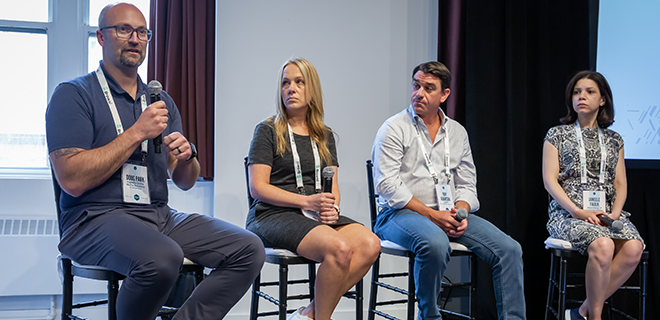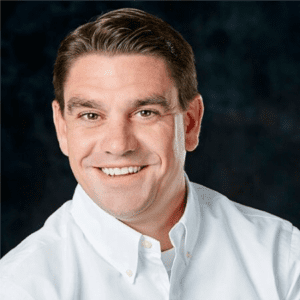
The Great Resignation is a phenomenon that has been sweeping the United States since 2021 as more Americans realize they have options when it comes to where they work. As more people voluntarily leave their jobs, it’s becoming evident that the value of a job lies in more than just the compensation, particularly for workers from younger generations. Employers must consider this shift in values along with the changing landscape of the workplace as they strive for employee retention.
At AdMonsters’ latest OPS event, Ray Adamson, Senior VP of Corporate Development for SEBPO, moderated a panel titled “The Secret Sauce to Boost Retention During ‘The Great Resignation’” during which panelists discussed how to attract new hires, retain talent, and tackle employee turnover.
A leading global outsourcing company, SEBPO services all areas of the advertising technology space. As such, the company is uniquely positioned to help its clients with any needs they have, despite the current state of the industry.
This helped SEBPO navigate the pandemic and subsequently the Great Resignation, both pivoting how the company itself operates as well as how it helps its clients do business.
“Our core DNA is in working remotely for our clients,” said Adamson, adding that clients found a sense of stability in SEBPO’s business model as they learned to navigate the pandemic and hoped to retain employees as work transitioned to a virtual or hybrid environment.
While a period of upheaval such as the Great Resignation might feel like a challenge, it can also present great opportunities. For example, noted Adamson, seeing employees virtually in their home environments gave employers no choice but to view them as whole people rather than simply as office workers. This in turn helped employers create a sense of belonging for their employees, just one piece of the puzzle when it comes to keeping talent.
Below, AdMonsters’ Q&A with Adamson highlights other key takeaways from the OPS panel and offers advice for employers who are struggling to navigate what work looks like today.
Kacey Perinelli: What are some of the root causes of the “Great Resignation,” and what are some “secret sauces” associated with companies who are addressing the root of the problem?
Ray Adamson: These problems existed before the pandemic, but COVID has raised awareness of a new level of employee needs based on looking at people’s lives holistically. There were opportunities that presented themselves for individuals to go to another company – it could be money, it could be hybrid work from home, those are some obvious reasons. And one of the things we landed on during this panel discussion was that for unhappy employees, band-aids didn’t work.
level of employee needs based on looking at people’s lives holistically. There were opportunities that presented themselves for individuals to go to another company – it could be money, it could be hybrid work from home, those are some obvious reasons. And one of the things we landed on during this panel discussion was that for unhappy employees, band-aids didn’t work.
For example, when business leaders spoke to dissatisfied workers, they would try to fix the problem by offering them another week of vacation time. Normally you would say, “Wow, that’s pretty amazing!” But what business leaders are running into is that it doesn’t matter how much vacation time you give somebody on your team if the time they spend away they’re worrying about everything that’s happening at work. So business leaders learned very quickly how to put the appropriate tools, vendors, and partnerships in place that allow people to use that time away to truly be away.
This is part of SEBPO and our business model, it was not just because of COVID but before the pandemic as well, the nature of our business means we are receiving emails at all hours and on holidays. When you have the right teams in place, people can close their laptop at the end of the workday and truly be done for the day. If you burn people out, they’re going to leave. I don’t care what business you’re in.
The secret sauces to employee retention can be boiled down to:
- Strong Foundations
- Flexibility
- Belonging
- Experience
- Futureproofing
KP: Can you share more on the secret sauce to building a Strong Foundation? And how do you rely on Experience?
RA: While we all hope something like COVID or the Great Resignation doesn’t happen again, the truth is it probably will so you have to plan for it. The written policies and procedures and boundaries and expectations are critical. Strong documentation is absolutely critical. Communication and documentation are also key. If you’re onboarding people in an environment where you can’t be face to face, that is the core of making sure people are happy, especially new people.
When you’re hiring people in a remote environment, which is going to be happening more and more, you can’t just say, “Oh, go look over Bill’s shoulder for three hours.” If you bring on a new employee and have garbage training documentation, all that’s going to do is frustrate them. When clients onboard us, we record the training and document it, share it with our customer so they can fill in the gaps, then update that training documentation on a weekly basis and keep it in a central depository that SEBPO and the clients’ teams can both use for future reference.
If you bring on a new employee and have garbage training documentation, all that’s going to do is frustrate them.
Another part of the foundation is making sure your total delivery model is sound. And what I mean by that is building a foundation to have the right partners and processes in place, including vendor partners, outsourced partnerships, and the technology platforms they use to help make sure that you’re able to weather a lot of these storms.
It is also important to retain experience, such as relying on experience that you have and that you can find in collaboration among peers. Whether that collaboration happens by phone, on Zoom, or in person at an AdMonsters event during a breakout session, sharing experience is critical.
Mentorships also play a role. What we’re doing as a community right now through groups like AdMonsters or Beeler.Tech, we’re working on different mentor programs where it doesn’t matter whether you’re a vendor, sponsor, a publisher, or an agency, if you have a specific strong area of your business and you can help work with another group of people to strengthen their business model, then we’re working as a community to try to build that collaboration.
KP: In an industry that is built on process, flexibility seems unnatural. How do you remain flexible?
RA: Any time you talk to folks in the AdMonsters space and ad ops people in general, they want to use processes and platforms to accomplish tasks in the most efficient way possible, so when the pandemic forced us to be flexible, we had to figure out how to do that. All of this comes back to setting goals to get results. Whether it’s pre-pandemic or post-pandemic, if you set expectations, flexibility becomes a lot easier because you’re all working to achieve the same thing.
We at SEBPO are also able to help our clients remain flexible based on their needs – we plug into all areas and help them out.
We at SEBPO are also able to help our clients remain flexible based on their needs – we plug into all areas and help them out. For a company that is growing very quickly, we can help them scale up to meet their goals. Likewise, in the case of an economic downturn, people who have to dial it back can also come to us and be able to do more with less.
KP: Belonging sounds like a new corporate buzzword. How is this significant?
RA: I think it’s huge. This is one of my biggest takeaways. For someone who is brand new to working remotely, how do they know they’re achieving what they’re supposed to? And how do we as business leaders create that sense of belonging? Some people are just quiet, they’re introverts, and they’ll suffer in silence until the point where they’re done.
What we found with some of the people on the panel is they slowly start to get people together, whether you dip your toe in the water with a rooftop happy hour where people are comfortable in open air, or put together a hiking trip where you get people together and try to build that sense of team, even that I think is going a long way with that sense of belonging.
KP: How do you Futureproof for unexpected global events such as COVID and the Great Resignation? What’s next? How do you keep the secret sauce simmering?
RA: I think this is a bit of a summary of everything we’ve discussed. It’s putting everything together but not in a fire drill fashion. Even if you feel like you’re behind the eight ball as it relates to planning for this, you have to start somewhere. You have to start doing this now in preparation for things going forward. The one outlier is something I heard at another conference: instead of performance reviews, have “potential reviews” with your employees. And I thought, how obvious to show somebody their path forward and a future with the company.
The speaker said talk to your people about where they’re going. Of course, you have to focus on performance – did you hit it, how are you feeling, what tools can we give you to do better – that is important. But make the lion’s share of the meeting: Where do you want to go? What do you want to do? Do you see yourself here, or in a different role? Do you want to be in the C-suite someday? Do you want to stay where you are right now and continue cranking out? That to me stood out as valuing your employees by talking to them about what they want because sometimes we don’t. Sometimes companies make the mistake of taking a top performer and promoting them to a team lead because you see their potential, but they don’t want that position and you never asked them what they want, so they get frustrated and they leave.
We also believe it is very important to attend AdMonsters events. These events give folks the best opportunity to network and continue to build relationships with peers as well as keep up with what is happening in the industry. This is one of the ways we at SEBPO keep the secret sauce simmering.